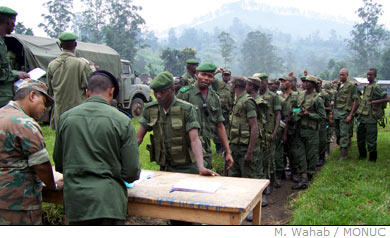 The mixing process of two of dissident General Laurent Nkunda’s loyalist brigades with three FARDC brigades has been ongoing now since the start of 2007, in a bid to address the serious security problems posed by Nkunda’s forces in the troubled Kivu provinces since 2004.
The mixing process of two of dissident General Laurent Nkunda’s loyalist brigades with three FARDC brigades has been ongoing now since the start of 2007, in a bid to address the serious security problems posed by Nkunda’s forces in the troubled Kivu provinces since 2004.
In this respect, the FARDC's (Congolese National Army) representatives held fruitful talks with the belligerent Nkunda and his aides in Dec 2006 in Kigali.
The talks, brokered by the Rwandan government, also enjoyed the support of the highest authorities in Kinshasa. After serious deliberations, both sides decided to reintegrate the brigades (rebel brigades of Nkunda and the FARDC brigades) by mixing and renaming them under new a new structure, in a process called mixing.
In essence, the mixing process aims at equally combining Laurent Nkunda’s 81st and 83rd brigades, and the rest of the combatants, with the FARDC’s 110th and116th Brigades, as well as the 1st Reserve brigade.
An estimated 4,500 to 5,000 of Nkunda troops, according to Nkunda's figures, are due to be combined with a similar number of FARDC troops. The new names for the five brigades after the mixing process are Alpha, Bravo, Charlie, Delta and Echo, and they are to be deployed across North Kivu province.
So far Alpha and Bravo brigades are under deployment after the mixing process, while the formation of Charlie brigade has just finished. In spite of some difficulties, the mixing process is likely to continue with the formation of the Delta and Echo brigades.
MONUC’s North Kivu brigade, under its UN mandate, is providing support to the ongoing mixing process by assisting the FARDC towards the establishment of peace and security in the province, according to Major Ajay Dalal, the MONUC North Kivu brigade spokesperson.
Related articles
- • Tshisekedi Announces Government of National Unity and Calls for Unity Against M23 Rebels (February 23, 2025)
- • UN Security Council Calls on Rwanda to Stop Supporting M23 Rebels in DR Congo (February 22, 2025)
- • DR Congo Citizens Head to Polls to Elect President, Members of Parliament (December 20, 2023)
- • 'Deadly environment' plus 'political and social' obstacles hinder Ebola fight, Security Council hears (July 24, 2019)
- • Ebola outbreak declared an international Public Health Emergency (July 17, 2019)
- • At least 30 dead after massacres in Ituri (March 2, 2018)
- • Political tensions 'running high' in DR Congo ahead of 2016 elections (October 7, 2015)
- • DRC Army Putting Pressure on FDLR (April 1, 2015)
- • ICC Confirms 14-Year Sentence Against Thomas Lubanga (December 1, 2014)
- • ICC sentences Germain Katanga to 12 years (May 23, 2014)
- • ICC finds Germain Katanga guilty of war crimes and crime against humanity (March 7, 2014)
- • Bosco Ntaganda Attacked Civilians on Ethnic Grounds, ICC Prosecutor Says (February 10, 2014)
- • New DR Congo amnesty law welcomed by UN envoys (February 5, 2014)
- • Colonel Mamadou Ndala Is Killed in Ambush (January 2, 2014)
- • No 'Peace Deal' With Defeated M23 Rebels, DR Congo Says (November 11, 2013)
- • Congo Will Not Sign a 'Peace Deal' With Defeated M23 Rebels, Government Says (November 6, 2013)
- • Congo Army Takes Control of Mbuzi Hill From M23 Rebels (November 4, 2013)
- • Kabila Congratulates Congo Army for Defeating M23 Rebels (October 30, 2013)
- • Advancing Congo Troops Take Control of Rumangabo From M23 Rebels (October 28, 2013)
- • Congo Army Liberates Rutshuru, Kiwanja and Kibumba From M23 Rebels (October 27, 2013)
- • Congo Army Dislodges M23 Rebels From Strategic Town of Kibumba (October 26, 2013)
- • Ban Ki-moon Confirms M23 Rebels Shelled Rwanda (August 31, 2013)
- • DR Congo Will Defend Itself Against an Attack by Rwanda, Government Says (August 31, 2013)
- • M23 Rebels Fired Shells Into Rwanda, Not Congo Army, UN Says (August 30, 2013)
- • Mortar Shells From Rwanda Kill Civilians in Eastern Congo (August 23, 2013)
- • Dozens of M23 Rebels Killed by Congo Army in Renewed Fighting (August 22, 2013)
- • UN Peacekeepers Start Enforcing Security Zone in Eastern Congo (August 1, 2013)
- • DR Congo Asks Rwanda to Turn Over M23 Rebel Leaders (July 26, 2013)
- • UN Security Council debate focuses on peace efforts for Africa's Great Lakes region (July 25, 2013)
- • M23 Rebels Said to Flee Rumangabo After Congo Army Airstrikes (July 25, 2013)
Tags: |







